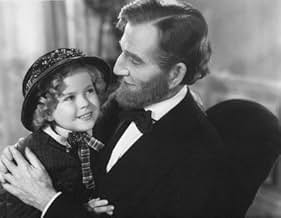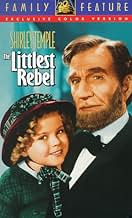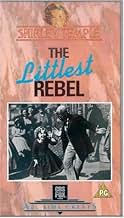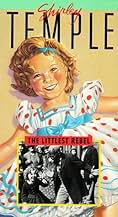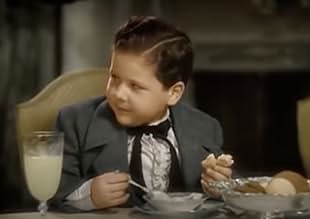Agrega una trama en tu idiomaShirley Temple's father, a rebel officer, sneaks back to his rundown plantation to see his family and is arrested. A Yankee takes pity and sets up an escape. Everyone is captured and the off... Leer todoShirley Temple's father, a rebel officer, sneaks back to his rundown plantation to see his family and is arrested. A Yankee takes pity and sets up an escape. Everyone is captured and the officers are to be executed. Shirley and "Bojangles" Robinson beg President Lincoln to interc... Leer todoShirley Temple's father, a rebel officer, sneaks back to his rundown plantation to see his family and is arrested. A Yankee takes pity and sets up an escape. Everyone is captured and the officers are to be executed. Shirley and "Bojangles" Robinson beg President Lincoln to intercede.
- Dirección
- Guionistas
- Elenco
- Premios
- 4 premios ganados en total
- Sgt. Dudley
- (as Guinn Williams)
- Dirección
- Guionistas
- Todo el elenco y el equipo
- Producción, taquilla y más en IMDbPro
Opiniones destacadas
The second is a chance to talk to your children about the way black characters and white characters interact in this film. Some younger children may be confused by the divide between the black characters and the white characters (especially those who attend racially-diverse schools,) but this is a good time to explain to them the racist attitudes of the time period, and ask them how it makes them feel.
The best way to combat racism is not to sweep it under the rug, but to teach children where we were, how far we've come, and how far we still need to go. Give children the credit they deserve, they will understand.
This film is a perfect opportunity to relate to your children and instill guidance.
Yes, Willie Best's character is an embarrassment when it is not infuriating. There's no arguing that.
But Bill Robinson's character is very different. He is the one on whom Mrs. Cary relies when her husband is at war, he is the one who makes it possible for Cary to get back to see his wife as she is dying, etc. He is also the one who makes it possible for he and little Virgie to get to Washington and, eventually, plead her father's case with President Lincoln. In short, he is the character who makes pretty much everything good happen.
Yes, there is injustice in that he should have received higher billing as a result, and he should have been in the final shot with Temple, as he was as important as her father and more important than Jack Holt. That was unfair, and though probably based on what Fox thought American audiences of the time would tolerate, nonetheless a concession to the racism of the time. But for its time, this movie is remarkably devoid of the "dumb and happy darkie" stereotypes of the time that are so infuriating.
Furthermore, little Virgie never once treats "Uncle Bill" as anything less than an equal. Nor do her parents ever treat him disparagingly.
Race relations in this movie are not perfect. But neither are they stereotypes. There is no point on zooming in on Willie Best's character and going through all the modern clichés of moral superiority, only to dismiss it. The movie deserves better than that.
Yes, the dancing by Robinson and Temple is a wonder. But this movie has other things that are worth examination as well.
Forget what you may have been told about this movie and try to watch it with an open mind. You won't waste your time.
That's because it has a great mixture of drama, comedy, song/dance and suspense. Almost all the characters are likable. The two dances scenes with Temple and Bill Robinson are excellent....a joy to watch. I don't know if Shirley ever looked cuter than in this film. She runs the gamut of emotions in here quite frequently.
The 74-minute story never has a lull. John Boles and Karen Moreley are people you root for, Willie Best provides good comedy and there is a surprising amount of suspense.
Overall, however, this is simply a sweet, sentimental film that leaves you feeling good after watching it.....and what's wrong with that?
This picture is set in Civil War South, and steps lightly through the minefield of the racism of slavery. Not sure if this picture could be made today, as racial tensions have been stewing since the Civil Rights Act of 1965, but this was 1935, and audiences had a better historical sense than is found nowadays. Just watch and enjoy the entertainment phenomenon that was Shirley Temple, Hollywood's all-time greatest scene-stealer.
6/10 - Website no longer prints my star ratings.
¿Sabías que…?
- TriviaBoth John Boles and Bill Robinson nearly drowned while trying to cross a raging, 15-foot river for an escape scene that was cut from the film.
- ErroresWhen the Union soldiers are caught looting, the commanding officer orders them to be flogged. The US Army according to the "History of the United States Army" stopped flogging at the beginning of the Civil War in 1861--this scene is obviously later in the war as Union forces are occupying the south.
- Citas
Virginia 'Virgie' Cary: [singing] Oh, I eat watermelon and I have for years. Sing Polly-Wolly-Doodle all the day! I like watermelon but it wets my ears. Sing Polly-Wolly-Doodle all the day!
- Versiones alternativasAlso available in a computer colorized version.
- ConexionesFeatured in Of Black America: Black History: Lost, Stolen or Strayed (1968)
- Bandas sonorasPolly Wolly Doodle
(1880) (uncredited)
Traditional
Modified Music by Sidney Clare (1935)
Modified Lyrics by Buddy G. DeSylva (1935)
Sung by Shirley Temple with Bill Robinson
Reprised at the end by Shirley Temple
Selecciones populares
- How long is The Littlest Rebel?Con tecnología de Alexa
Detalles
- Fecha de lanzamiento
- País de origen
- Idioma
- También se conoce como
- La pequeña rebelde
- Locaciones de filmación
- Productora
- Ver más créditos de la compañía en IMDbPro
- Tiempo de ejecución1 hora 13 minutos
- Color
- Relación de aspecto
- 1.37 : 1
Contribuir a esta página



